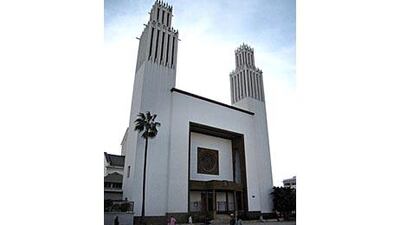AIN LEUH, MOROCCO // On the hill the police cars were assembled, the Christians were packing their suitcases and the children were screaming. In a field below, a Muslim farmer called Hassan Kasim was blinking through tears at the scene.
"The government says they were missionaries," he said, recalling the day last month when Moroccan authorities expelled Christian foster families from the Village of Hope, a children's home next to his farm. "Maybe they were, maybe they weren't. But I know they were my friends." The families were among dozens of Christians summarily deported last month, accused of abusing Morocco's religious freedoms to convert Muslims. The government says it is upholding the law, but critics worry that tolerance is eroding as authorities appear to blur the line between illegal proselytising and living a Christian life.
For Christian priests and charity workers in Morocco, "clearly it's unsafe right now," said Ahmed Benchemsi, the Muslim editor of TelQuel, a leading news weekly. "I don't think we have true tolerance; we have a mixed system whose rules are unclear." "We have absolutely nothing against Christianity or any other religion," said Khalid Naciri, Morocco's communication minister. However, recent complaints by Moroccans of alleged proselytising have forced the authorities to act, he said.
Authorities said 27 Christians of several nationalities were deported last month; diplomats put the number at around 50. The US ambassador, Samuel Kaplan, issued a statement condemning the absence of judicial oversight in the deportations. Most appear to have been carried out in a matter of days. However, those expelled may have escaped tougher penalties, said Ahmed Herzenni, the president of King Mohamed VI's advisory council on human rights, and a Muslim. "If things had been submitted to the judicial system, it might have been harsher."
The issue of due process is secondary for Mustapha Ramid, a senior member of the Islamist opposition Justice and Development Party. "For me, the most important thing is that children aren't being taken advantage of." The government initially told the US embassy that more expulsions were possible, said Aaron Schwoebel, an embassy spokesman. It is unclear whether more have occurred. Scores of churches operate legally in Morocco, catering mainly to foreigners, while Christians are engaged in charitable work around the country.
"Now this is all being called into question," said Jack Wald, the pastor of the Rabat International Church, in Morocco's capital, and chairman of the Village of Hope's governing board. "Is the government not going to allow Christians to make any expressions of compassion?" According to Nadia Yassine, the spokeswoman of the grass-roots Islamist movement Justice and Charity, some Christian aid workers exploit Morocco's poor and unemployed by mixing charity with proselytising.
"We can show these evangelists the door, but more will come," she said. "To defend ourselves, we need a sound economy." Christians were largely barred from Morocco before France took control in 1912, establishing schools aimed in particular at winning over the minority Amazighs, or Berbers, to counterbalance Morocco's Arab elite. Christianity was not in the curriculum; but in the "Berber Schools", neither was Islam.
The French left in 1956. Today Islam is Morocco's state religion and King Mohamed its highest religious authority, while other faiths are officially welcome in the country. The Village of Hope, a collection of gabled white buildings near the village of Ain Leuh in the Middle Atlas Mountains east of Rabat, opened in 1999. By last month, 33 abandoned children were living there with Christian foster families and attending an on-site school that followed Morocco's state curriculum, said Mr Wald.
"The government gave permission knowing that Christians were going to raise them," he said. "We had multiple inspections by social and education services. For 10 years we received nothing but glowing reports." Elsewhere, however, concern over Morocco's religious identity following Islamist suicide attacks in Casablanca in 2003 has led authorities to crack down on any religious trend seen to threaten the country's state-approved moderate Islam - including Christian evangelism, said Mohamed Darif, a politics professor at Morocco's Mohammedia University.
Last month that campaign reached the Village of Hope when police carried out three days of investigations ending in a sudden order for 16 Christians to leave the country.
"The kids streamed across the ground to cling to us adults. The screams and wailing were just unbelievable," said Chris Broadbent, the Village of Hope's human resources manager, who was expelled with his wife and two natural-born children. "One friend of mine was trying to pack his suitcase, and his Moroccan children were pulling things out." Authorities accused Village of Hope staff of attempting to convert Moroccan children to Christianity under cover of foster care - a charge the institution denies.
"The children were taught the Quran in school using the Moroccan curriculum, but when they went home their parents were Christians," said Mr Wald, referring to the foster families. "At what point does living your life become proselytising?" In his field, Mr Kasim was planting this year's potatoes and trying to decide what to think. Soldiers barred the gate of the Village of Hope and the sound of children's voices floated from inside the walls.
"Maybe sending Muslim kids to live with Christian families was asking for trouble," he said. "But they were good people; they were my friends. I hope they return." jthorne@thenational.ae

